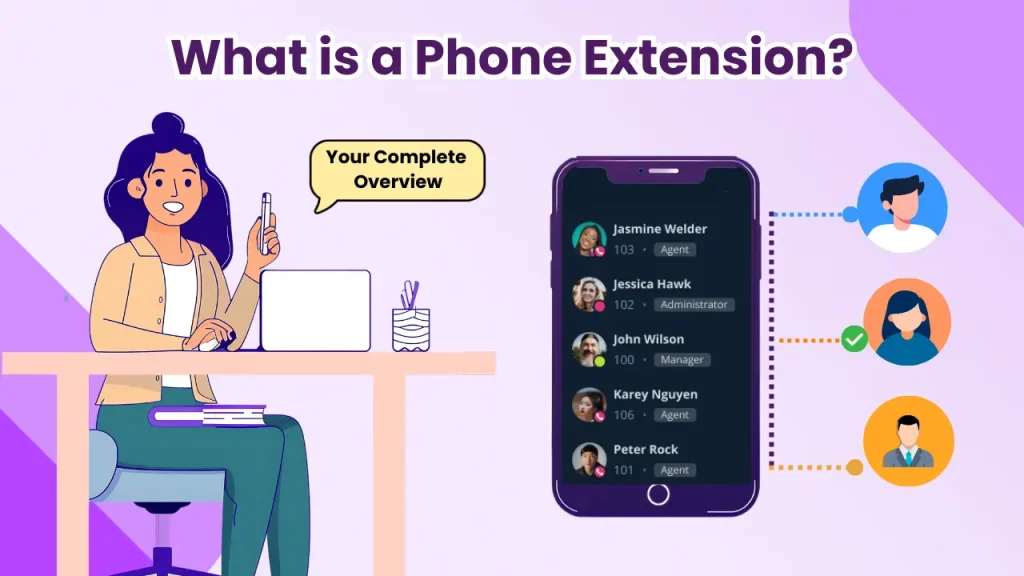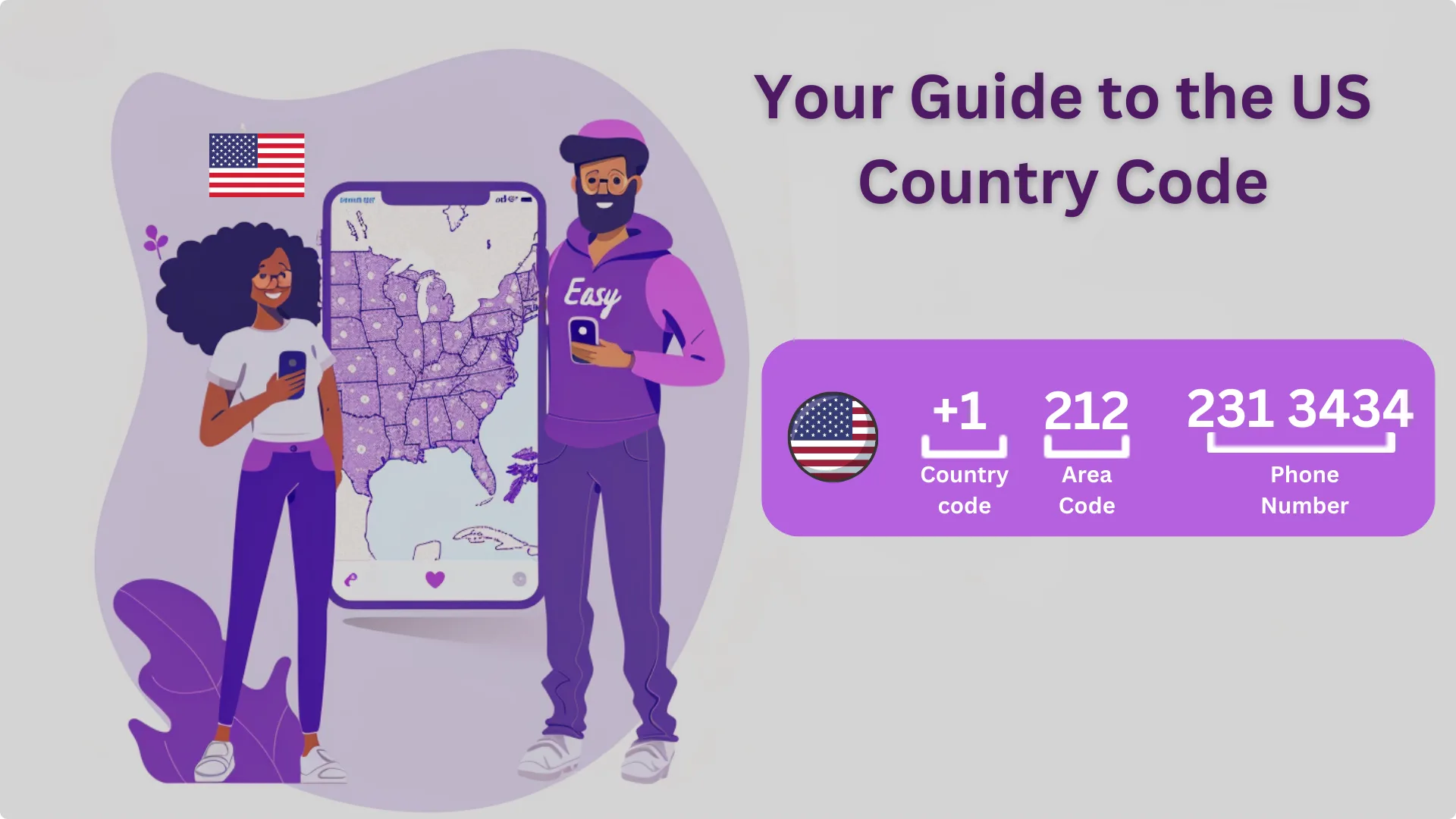Have you ever wondered how businesses manage to efficiently handle incoming calls and direct them to the right departments or employees?
The answer lies in phone extensions. These short numbers added to a main business line serve as shortcuts for callers, making communication quick and easy. Calls are routed to specific extensions within a business phone system using call routing, call forwarding, and automatic call distribution to ensure they reach the appropriate destination.
In this article, we will explore what phone extensions are, how they work, why they are used, the benefits they offer, how to set up a system, the different types, and how to use them effectively.
Let’s dive in and discover what is a phone extension!
Key Takeaways:
- Phone extensions are short numbers added to a main business line for efficient communication.
- They allow for quick call routing and help maintain a professional image for a company.
- Setting up a phone extension system requires determining the number of extensions needed, choosing a phone system, and assigning extensions to employees or departments.
What Is a Phone Extension?
Within the complex landscape of US telecommunications, efficient internal communication is critical for business success. To streamline call routing and enhance productivity, organizations often employ a system of internal dialing codes. These unique identifiers are assigned to individuals or departments, enabling callers to quickly connect with specific personnel.

Modern business phone systems, such as Voice over Internet Protocol (VoIP), heavily rely on this approach. By leveraging internet technology, VoIP offers cost-effective and flexible solutions for managing internal calls, contributing to improved customer service and employee satisfaction.
How Does a Phone Extension Work?
Internal dialing systems use unique identifiers to direct calls within a company. Each individual or department is assigned a specific number, linked to a unique IP address, use an online tool to check your IP. When someone dials this number, the system routes the call to the corresponding device, regardless of the caller or recipient’s physical location.
VoIP technology powers this process by converting voice into digital data packets, transmitted over the internet. This allows for flexible call routing, such as forwarding calls to different devices or locations. Additionally, VoIP offers features like voicemail and call screening, enhancing communication efficiency.
Why Are Phone Extensions Used?
They are used to streamline communication within a VoIP system, making it easier for call centers and customer service departments to efficiently manage incoming calls. Using multiple extensions allows handling calls from different departments or individuals, ensuring that each call is directed to the appropriate recipient.

When organizations implement this, they create a structured system that enables swift call routing and distribution. This division of labor ensures that calls reach the most qualified agent promptly, enhancing customer satisfaction and reducing wait times. By assigning unique extensions to each employee, internal communication is also optimized, promoting collaboration and knowledge sharing within the team.
What Are the Benefits of Phone Extensions?
The benefits include improved call management, efficient communication, and a professional business image, often facilitated by VoIP vendors and enhanced by call forwarding features within a VoIP service. Integrating cell phones and desk phones into the phone system further enhances mobility and connectivity for employees, allowing them to work from multiple locations or on the road.

Quick and Easy Communication
Efficient internal communication is essential for businesses, particularly those with customer-facing teams. By assigning unique identifiers to employees or departments, modern phone systems enable swift call routing and transfer.
This improves response times, ensuring customers connect with the right person promptly. Advanced features like call monitoring and performance tracking provide valuable insights for managers, helping to optimize call handling and enhance overall customer satisfaction.
Efficient Call Routing
Effective call routing is a key benefit of modern phone systems. By assigning specific numbers to individuals or teams, businesses can quickly direct incoming calls to the appropriate recipients.
This streamlined approach improves communication efficiency, reduces call handling time, and enhances overall customer satisfaction.
Professional Image
A well-structured internal dialing system can significantly enhance a company’s professional image. By enabling callers to quickly connect with the right person or department, businesses can streamline interactions and improve customer satisfaction. This efficiency reflects a well-organized operation, leaving a positive and lasting impression.
Recognizing the value of this feature, VoIP providers often highlight the professional benefits of internal dialing in their marketing campaigns. These platforms emphasize how the technology can elevate a company’s image and attract clients by providing a seamless and efficient customer experience.
How to Set Up a Phone Extension System?
The system involves determining the number of extensions needed, choosing a suitable VoIP service provided by reliable VoIP vendors, and assigning extensions to the respective employees.

Determine the Number of Extensions Needed
The first step in setting up a system is to determine the number of extensions needed, which can vary based on the size of your call centers, customer service teams, and the physical locations of your business operations.
For call centers, it’s crucial to calculate the number of agents who will need dedicated extensions to handle incoming calls efficiently. Efficiency is key in such high-volume environments as it directly impacts customer satisfaction and response times.
In customer service departments, the focus shifts towards ensuring every representative has their extension to manage customer inquiries effectively. A streamlined communication system can significantly enhance the overall customer experience.
When your business has multiple physical locations, it becomes essential to allocate extensions based on the requirements and communication flow specific to each site. This customization ensures seamless connectivity across all branches.”
Choose a Phone System
Choosing a phone system is a crucial step, with options like VoIPstudio and MightyCall offering robust VoIP systems tailored to different business needs.
When looking for the right VoIP phone system, it’s essential to consider factors such as scalability, integration capabilities, and customer support.
VoIPstudio stands out for its user-friendly interface and advanced features like call recording and conferencing. On the other hand, MightyCall is known for its mobile app and virtual receptionist service, making it ideal for small businesses.
Comparing the two, VoIPstudio may be more suitable for larger enterprises needing extensive communication tools, while MightyCall excels in providing a streamlined solution for small teams.
Assign Extensions to Employees or Departments
Assigning extensions to employees or departments is the final step, a task typically managed by the admin, who ensures that call forwarding and other features of the VoIP service are properly configured.
Once the admin receives the list of employees and their respective extensions, they navigate through the VoIP system’s admin dashboard.
Within the dashboard, the admin accesses the extension settings where they input the specific numbers assigned to each employee or department.
Along with setting up call forwarding, the admin may also configure voicemail greetings, call routing rules, and other personalized features to enhance communication efficiency.
What Are the Different Types of Phone Extensions?
Different types, including direct, virtual, and shared extensions, each utilizing unique VoIP numbers and IP addresses within VoIP phone systems to cater to specific business needs.

Direct Extension
A direct extension assigns a specific VoIP number to an employee or department, allowing for easy access regardless of their physical location within the organization.
Direct extensions offer businesses the flexibility to streamline communication processes by enabling efficient routing of calls directly to individuals or teams. This feature ensures that important calls reach the designated recipient promptly, enhancing overall workflow and productivity.
Direct extensions contribute to a more professional image for the company, as clients and partners can easily connect with the right person without delays or confusion. This personalized approach fosters stronger relationships and customer satisfaction, ultimately benefiting the organization’s reputation and bottom line.
Virtual Extension
Virtual extensions in VoIP phone systems use call forwarding and IP address mapping to route calls to employees’ mobile phones or remote offices.
Virtual extensions act as a bridge between traditional phone systems and modern communication needs, offering a seamless way to connect employees regardless of their physical location.
By setting up virtual extensions, businesses can enhance productivity and accessibility for remote workers, allowing them to stay connected with clients and colleagues as if they were in the office.
The flexibility provided by virtual extensions enables employees to work from anywhere with a stable internet connection, ensuring continuous communication and collaboration.
Shared Extension
A shared extension is commonly used in call centers and customer service departments, allowing multiple employees to answer calls through a single VoIP service number.
By utilizing shared extensions, organizations can streamline their communication processes, ensuring that all incoming calls are promptly attended to. This setup enables teams to work cohesively, share workload efficiently, and boost overall productivity.
Shared extensions help create a centralized system for monitoring calls, tracking performance metrics, and providing seamless customer support. This centralized approach reduces the chances of missed calls or customers being redirected multiple times, improving the overall customer experience.
How to Use a Phone Extension?
Involves dialing the main business line followed by the extension number, a process supported by VoIP vendors that provide services for US phone numbers and are integral to the telecommunications industry. Phone number extensions play a crucial role in directing callers to the correct extension, ensuring efficient communication within the organization.
Dialing an Extension
Dialing an extension involves entering the main business number followed by the unique VoIP number assigned to the extension, which is mapped to an IP address.
When a caller dials the main business number, the VoIP system recognizes the appended extension number and routes the call accordingly. The VoIP number acts as a digital identifier linked to the physical extension within the organization. This unique number is crucial for seamless internal communication, ensuring that calls reach the intended recipient efficiently. Through IP address mapping, the VoIP system translates the extension number into a specific IP address, facilitating a direct connection between the calling party and the destination extension. This streamlined process enhances overall communication efficiency within the workplace.
Transferring Calls to an Extension
Transferring calls to an extension is facilitated by call forwarding features, which can be managed by the admin to ensure calls reach the correct destination.
When setting up call forwarding, the admin can designate specific extensions to route calls to, depending on criteria such as time of day or availability. By configuring these settings in the phone system’s interface, the admin can customize the call flow to suit the organization’s needs efficiently.
The admin can monitor call forwarding activity, ensuring that calls are redirected seamlessly without interruption. This oversight helps in maintaining effective communication within the organization while ensuring all calls are promptly attended to.
Setting Up Voicemail for an Extension
Setting up voicemail for an extension within a VoIP service ensures that messages can be left for employees regardless of their physical location.
Having this feature configured correctly is vital for companies with employees distributed across various offices or working remotely. By setting up voicemail, employees can receive important messages, updates, and notifications even when they are away from their desk or out of the office.
Voicemail provides a convenient way for clients and partners to leave messages outside of regular working hours, ensuring that no communications are missed and maintaining a high level of professionalism within the organization.
What Are the Alternatives to Phone Extensions?
Alternatives include direct dial numbers, automated attendants, and call forwarding, each offering unique solutions for call centers and customer service operations within VoIP phone systems.

Direct Dial Numbers
Direct dial numbers provide a way for callers to reach specific employees or departments directly using individual US phone numbers, regardless of their physical location.
By using direct dial numbers, organizations streamline their communication process, allowing customers and clients to connect seamlessly with the right person or department without the need for call routing or receptionists. This translates to quicker response times, improved customer satisfaction, and enhanced operational efficiency.
A key benefit is the personalized touch it adds to interactions, creating a direct line for customers to establish relationships with designated contacts. This direct access fosters a sense of trust and reliability as callers connect instantly with the individuals they seek, enhancing overall communication effectiveness across different locations.
Automated Attendant
An automated attendant within a VoIP system can manage incoming calls to call centers and customer service departments by providing menu options and routing calls accordingly.
Automated attendants work by presenting callers with a series of menu options, typically through voice prompts or keypad selections. These options allow callers to navigate the system and choose the appropriate department or service they require. Through intelligent call routing technology, the automated attendant can direct calls to the right destination efficiently and without the need for human intervention.
Automated attendants play a crucial role in managing call flows by streamlining the process of routing incoming calls. They help reduce wait times for customers, ensure calls are directed to the correct department, and free up human agents to handle more complex queries.
Call Forwarding
Call forwarding, supported by VoIP vendors, allows calls to be redirected to different numbers or devices, leveraging IP address mapping to maintain seamless communication.
One of the key advantages of utilizing call forwarding is the flexibility it provides in managing incoming calls. With this feature, businesses can ensure that important calls are never missed, even if the primary number is unavailable. By incorporating IP address mapping, call forwarding can efficiently reroute calls based on predetermined criteria, such as time of day or caller ID. This level of customization not only enhances customer service but also improves overall communication efficiency.
Conclusion
Phone extensions play a crucial role in modern business communication, supported by VoIP systems and vendors, contributing significantly to the efficiency and effectiveness of the telecommunications industry.
In today’s fast-paced business environment, efficient communication is the key to success. Modern phone systems not only streamline internal communication within organizations but also enhance external interactions with clients and partners. By integrating seamlessly with advanced VoIP systems, these extensions enable features like call forwarding, voicemail to email transcription, and conference calling, revolutionizing how businesses communicate. With various vendors offering tailored solutions to meet specific business needs, the impact of phone extensions on the telecommunications industry continues to evolve, paving the way for improved connectivity and productivity.
FAQ's
What is a phone extension?
A phone extension is a short number that is added to a main business line, allowing callers to reach specific employees or departments quickly and easily.
How do internal phone numbers work?
Modern phone systems use unique identifiers to direct calls within a business. Each employee or department is assigned a specific number, allowing callers to reach the desired person or team quickly and efficiently.
Do I need this for my business?
It depends on the size and structure of your business. If your company has multiple employees or departments, a phone extension can help streamline communication and make it easier for callers to reach the right person.
How do I set up a Modern phone system for my business?
To set up a phone extension, you will need to have a business phone system in place. You can then assign unique extensions to each employee or department, either through the phone system’s settings or by contacting your service provider.
Can I have multiple extensions for one employee?
Yes, it is possible to have multiple phone extensions for one employee. This can be useful if the employee works in different departments or has different roles within the company.
Can a phone number extension be used for external calls?
Yes, a phone extension can be used for both internal and external calls. However, external callers will need to know the extension number in order to reach the designated person or department.
Can I use a phone number extension with a mobile phone?
Yes, many VoIP phone systems allow you to use a phone extension with a mobile phone. This means you can answer business calls on your personal phone while maintaining a professional business number.
What is the difference between a phone number extension and a direct dial number?
A phone extension is a number used within a company to reach specific individuals or departments. A direct dial number is a dedicated phone number assigned to an individual, often used for external calls and accessible without going through a main company number.
Can I forward my phone extension to another number?
Yes, most phone systems allow you to forward your phone extension to another number, such as your mobile phone or a different extension. This is useful for call forwarding or remote work.
Can I use extensions with a virtual phone system?
Absolutely, phone extensions are a common feature of virtual phone systems. These systems often offer additional benefits like call recording, voicemail to email, and call analytics.




